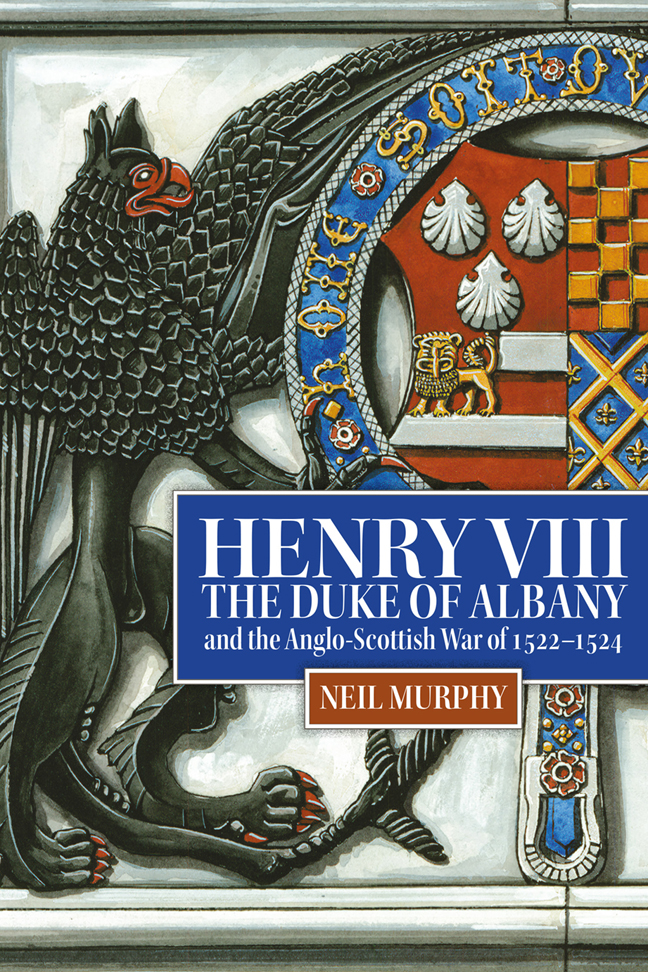Book contents
- Frontmatter
- Dedication
- Contents
- List of Maps
- Acknowledgements
- List of Abbreviations
- Glossary of Selected Scots Words and Terms
- Introduction
- 1 Albany's Return to Scotland to the Sack of Jedburgh (November 1521–September 1523)
- 2 Albany's March on Wark to the Treaty of Berwick (September 1523–January 1526)
- 3 Military Mobilisation in Scotland
- 4 The Supply of Scottish Armies
- 5 The Destruction of the Scottish Borders
- 6 The Defence of the English Frontier
- 7 Spies and Informers
- Conclusion
- Bibliography
- Index
2 - Albany's March on Wark to the Treaty of Berwick (September 1523–January 1526)
Published online by Cambridge University Press: 10 January 2024
- Frontmatter
- Dedication
- Contents
- List of Maps
- Acknowledgements
- List of Abbreviations
- Glossary of Selected Scots Words and Terms
- Introduction
- 1 Albany's Return to Scotland to the Sack of Jedburgh (November 1521–September 1523)
- 2 Albany's March on Wark to the Treaty of Berwick (September 1523–January 1526)
- 3 Military Mobilisation in Scotland
- 4 The Supply of Scottish Armies
- 5 The Destruction of the Scottish Borders
- 6 The Defence of the English Frontier
- 7 Spies and Informers
- Conclusion
- Bibliography
- Index
Summary
While he was camping outside the ruins of Jedburgh on 23 September, Thomas Howard, earl of Surrey, received word that John, duke of Albany, had landed at Dumbarton on the previous day with a French army. He immediately broke camp and returned to England to prepare the defence of the north. Whereas Albany's previous visit to Scotland was motivated, initially at least, by a concern to restore domestic political stability and crush internal challenges to his authority, he returned in September 1523 specifically to invade England. Although Albany brought with him a large French army composed of seasoned soldiers, he faced considerable difficulty in preparing his invasion, particularly because he arrived late in the year – months later than he had planned to return – and towards the end of the campaigning season, which meant that he needed to raise men and supplies quickly before the onset of winter made the expedition unworkable.
The first part of this chapter explores how Albany tackled these challenges and set about organising the war. Although he ultimately failed to mobilise a sufficiently large host, nonetheless he marched his Franco-Scottish army to the border and laid siege to the English border fortress of Wark. Although he failed to take the castle, he caused considerable damage to its defences before returning to Edinburgh following the coming of Surrey's army. Although Albany's withdrawal is often presented as the moment that led the principal Scottish lords finally to abandon him, this chapter shows that a closer reading of the evidence demonstrates that in fact the Scottish nobles remained close to Albany and implored him to remain in Scotland as a governor. Moreover, while the failure of Wark is typically taken as the end point of the war, the second part of the chapter shows that the conflict continued for over a year more. It is important to consider the extended duration of the conflict because the traditional view that the war ended at Wark has given the impression that the Scottish army was antiquated and no match for the English. Yet the Scots took the offensive in 1524 and launched a number of devastating attacks on northern England, which Henry VIII's commanders struggled to repel.
- Type
- Chapter
- Information
- Publisher: Boydell & BrewerPrint publication year: 2023



